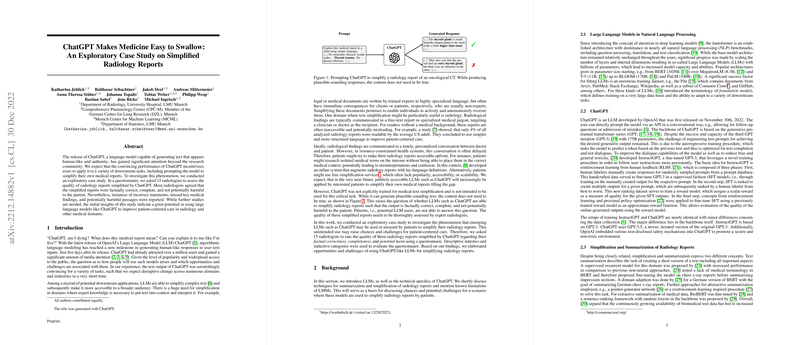An Exploratory Case Study on Simplified Radiology Reports by ChatGPT
The academic paper titled "ChatGPT Makes Medicine Easy to Swallow: An Exploratory Case Study on Simplified Radiology Reports" investigates the applicability of the LLM, ChatGPT, in simplifying complex medical texts, specifically radiology reports, for a non-expert audience. With the emergence of ChatGPT, powered by the advancements in LLMs, there is a growing anticipation for their use in diverse fields, including medicine, to enhance the accessibility of specialized knowledge.
Methodology and Findings
The authors conducted an exploratory case paper wherein they presented radiologists with original and ChatGPT-simplified radiology reports. These reports pertained to fictitious clinical scenarios designed to reflect moderate complexity found in clinical practice. Fifteen radiologists participated, evaluating the simplified reports based on factual correctness, completeness, and potential harm.
Key numerical findings include:
- The simplified reports were generally rated as factually correct (median rating of 2), suggesting confidence in the basic accuracy of ChatGPT's text transformation capability.
- Completeness was valued slightly higher than factual correctness, indicating the model's ability to retain key information while reducing complexity.
- Importantly, the potential for harm through patient misinterpretation was deemed low (median rating of 4), suggesting that, although simplification ineffectively eliminates complexity completely, it remains within safe bounds.
Analysis of Simplification
Despite overall positive evaluations, the paper highlights specific areas of concern. The simplified reports occasionally presented inaccuracies due to the misinterpretation of medical terms, use of imprecise language, hallucinations (introducing non-existent information), and unsatisfactory localization of described conditions. These issues underline the limitations in current LLM deployments, manifesting the challenge of maintaining intricate detail and precision essential in the medical field.
Implications
The positive feedback regarding the model's capacity to simplify radiology reports presents significant implications. If capable of refinement, ChatGPT-like LLMs could become integral to patient care, empowering patients to comprehend their medical information more autonomously, thereby fostering patient-centered care. This simplification could be particularly beneficial where language or medical literacy barriers exist.
However, it is paramount to recognize the limitations and associated risks. The potential misinterpretations could lead to detrimental patient outcomes if users mistakenly or prematurely act on simplified information without appropriate medical guidance. Thus, the authors advocate for continued expert oversight and the need for developing domain-specific iterations of LLMs.
Future Directions
This research opens several avenues for further exploration. Firstly, addressing the exemplified limitations could involve fine-tuning LLMs with medical data, potentially through reinforcement learning with human feedback (RLHF) specific to the medical domain. Furthermore, integrating these models into clinical workflows, where automated simplifications are validated by medical professionals before being presented to patients, could harness their potential while mitigating risks.
In conclusion, this paper provides foundational insight into using LLMs for medical text simplification. While these preliminary findings endorse the concept's viability, they also emphasize the necessity for cautious implementation complemented by continuous expert input to ensure safety and efficacy in medical settings.
